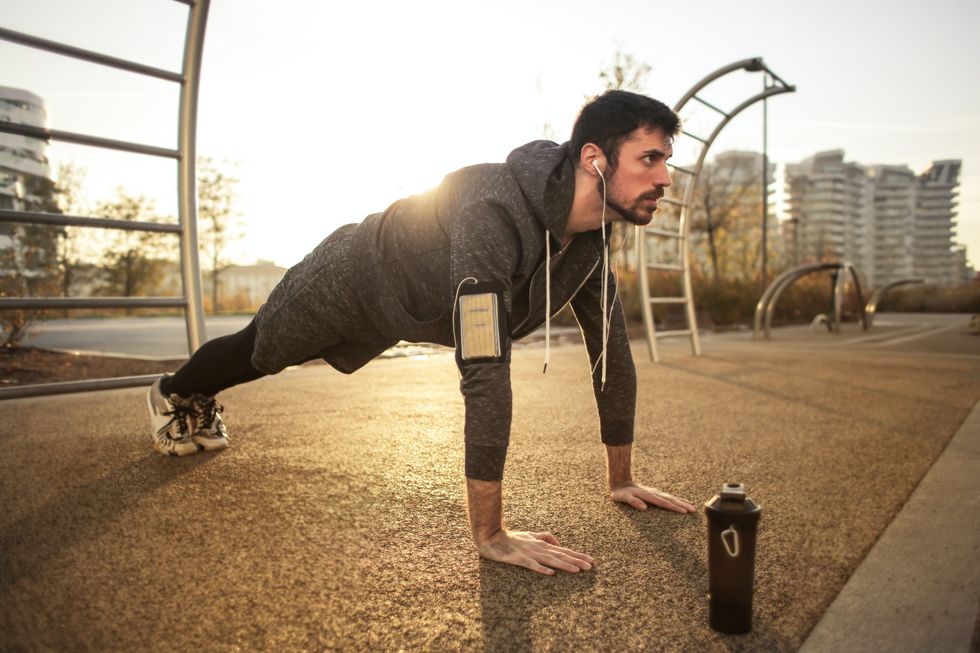Want to live longer? Three exercises under five minutes can add YEARS to your life, scientists say

Short bursts of exercise can add years to your life, multiple studies suggest
|Getty Images

Upping the intensity of your workouts could be the missing piece of the puzzle, say longevity experts
Don't Miss
Most Read
Latest
It might sound paradoxical but you can add years to your life in a matter of minutes.
Research suggests that high-intensity workouts offer the same benefits as regular exercise in half the time.
Sound too good to be true? Think again. Activities that get the heart pumping accelerate calorie burn, reduce body fat, lower heart rate and blood pressure.
So, what should you do? Any short burst of exercise is better than nothing but here are three backed by solid evidence:
Push-ups
Doing as many push-ups as you can in one minute may slash your risk of heart disease - the leading cause of death globally.

Push-ups work several muscle groups at once
| PEXELSHarvard researchers analysed data from 1,104 healthy firefighters, average age 40, who did not have cardiovascular disease.
Each man performed as many push-ups as possible in one minute. The men also had treadmill tests to measure their cardiovascular health and aerobic fitness.After 10 years, the researchers found that the men who had originally performed the most push-ups were least likely to get heart disease.
Specifically, those who could do 40 or more push-ups had a 96% lower risk than those who could only do 10 or fewer push-ups. The men who could do at least 11 push-ups had a lower risk too, but the more they could do, the greater the benefit.
As Harvard Health explains, push-ups engages your body from top to bottom. It works several muscle groups at once: the arms, chest, abdomen (core), hips, and legs. Push-ups also can be modified as needed.
How to do a push up:
- Get on all fours with your arms straight and your hands placed slightly wider than your shoulders
- Keep your legs in line with your backBend your elbows to lower yourself toward the ground
- Stop when your elbows are at 90-degree angles
- Straighten your arms to push yourself back up into your starting position to complete a rep
- Complete as many reps as you can while maintaining proper form
Brisk walking
A brisk walk can hack your body clock in as little as five minutes, research suggests.
Scientists at the Diabetes Research Center at the University of Leicester in the UK found that the quicker a person's reported walking pace, regardless of their overall physical activity, the longer their telomeres.
Telomeres are "caps" on the ends of our chromosomes that play a key role in the process of ageing.
They protect our chromosomes during cell division, like the plastic on the ends of a shoelace protects it from unraveling.
Telomere length shortens with age so how long yours is may predict how long you live.
In the study, published in Communications Biology, researchers quizzed more than 405,000 UK Biobank participants on their walking habits to try and understand whether there was any association between walking pace and telomere length.
A little over half reported an average walking pace, around 40 percent reported a brisk pace and six percent reported a slow pace.
The researchers found that the people who reported walking at an average or brisk pace had longer telomeres than those who reported walking at a slow pace.
They note that even five minutes of brisk walking per day can make a difference.
How to do a brisk walk
According to the NHS, a brisk walk is about three miles an hour, which is faster than a stroll.
"You can tell you're walking briskly if you can still talk but cannot sing the words to a song," explains the health body.
LATEST DEVELOPMENTS
- Dementia warning as breakfast cereals loved by millions of Britons may increase risk of brain decline
- 'Avoid!' Common 'cholesterol-lowering' vitamin added to bread, meat and pasta may hike risk of heart attack
- Type 2 diabetes 'danger' signs to spot as one million Britons do NOT know they have it, dire statistics show

Lifting weights can slash your risk of death and you can improve your strength in just three seconds, research suggests
|Getty Images
Lifting weights
Lifting weights can slash your risk of death and you can improve your strength in just three seconds, studies suggest.
One study, published in British Journal of Sports Medicine, involved surveys from nearly 100,000 men and women ages 55 to 74.
Participants reported the frequency and duration of their exercise, including moderate and vigorous physical activity and weight lifting.
And a small study published in the Scandinavian Journal of Medicine and Science in Sports suggests these benefits can be achieved in as little as three seconds.
Researchers from Edith Cowan University in Australia and Niigata University in Japan looked at 39 healthy college students over a four week period of working out.
Another ten students did not work out, but were monitored as a control group.
For five days a week, participants performed one of three different bicep curl variations: isometric (holding the weight parallel to the ground), concentric (raising the weight) or eccentric (lowering the weight).
Each exercise was three seconds of max effort using a special resistance machine.
Researchers measured participants' strength in each of the exercise types before and after the four weeks.
At the end of the study, participants were about 10 percent stronger, on average, by doing a total of 60 seconds of exercise during the course of the month.
The results suggest small doses of exercise could yield significant strength gains, although beginners will likely benefit the most, according to Ken Kazunori Nosaka, co-author of the study and professor of exercise science at Edith Cowan.
"'No time for exercise' is the most common excuse not to do exercise regularly, but exercise for three seconds may not affect time so much," he told Business Insider.
The benefits of lifting weights
As the NHS explains, muscle-strengthening activities help maintain the ability to perform everyday tasks and slow down the rate of bone and muscle loss associated with ageing.
"Such exercises can also help reduce your chances of falling."
You can lift weights by following these simple steps:
- Move the weight up and down in an unhurried, controlled fashion to isolate the muscles you want to work
- Rest for about one minute between each exercise







